#Self Help Books
Text
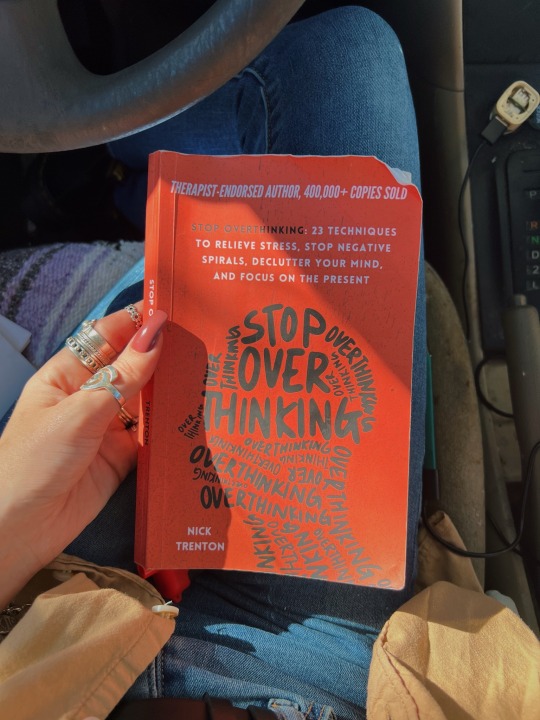
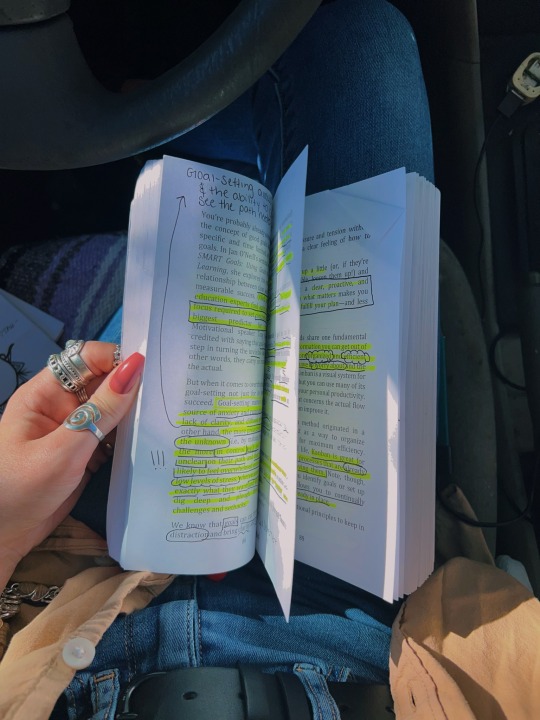
In January, I had a mental breakdown and lost my shit about how I felt like I didn’t have enough time for me, all my energy goes to other people, and my head is spinning 24/7. I wasn’t sleeping through the night and if I did fall asleep, I was awoken by night terrors.
I’m not one for self help books, despite my love of reading. I think they’re cheesy and all the same “lalala bullshit” of meditate! Eat well! Wake early! Gratitude! But thiiiiis book 360-ed my mind on self help books.
This author approaches anxiety and overthinking in a realistic way to stop the overthinking with positive changes. The tips and tricks to come back from reality and out of your mind are actually usable in the day to day life, even when I’m working with customers. My therapist always suggests yoga or mediation and it makes me want to scream because it never is plausible in the moment of when I’m having panic attacks or I’m stuck in my head.
This book will be a tool I will probably always open when I’m struggling in the future. The way it actually HELPED and has brought me some calmness in my mind makes me want to stand on a street corner and preach about this book. I know it’s only been a month since I lost it, but I can already feel a lightness coming over me after reading this. I feel more in control over my mind and how I react. Now it is up to ME to utilize these tools and act on the want and need of change. Highly recommend for anyone who is stuck in their head or feels like they’re not living in reality.
#personal#hipster#hippie#boho#good vibes#hippie vibes#bohemian#happy#peaceful#peace#it’s all good#aesthetic#book#bookworm#current read#self help books#healing#stop overthinking
31 notes
·
View notes
Text
𝐢𝐢. 𝗇𝖺𝗒𝗈𝗎𝗇𝗀'𝗌 𝗋𝖾𝖺𝖽𝗂𝗇𝗀 𝗀𝗎𝗂𝖽𝖾

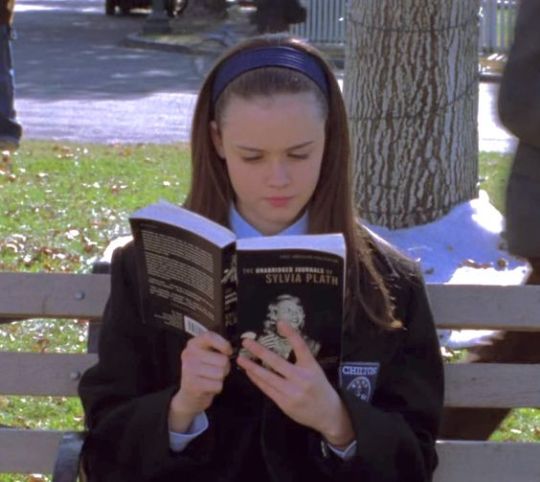
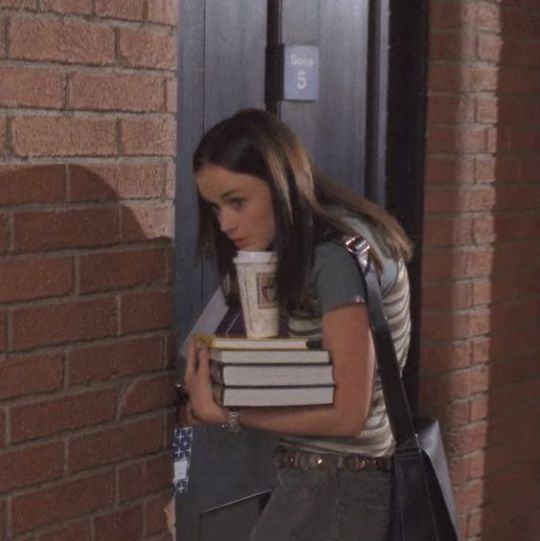
books to start the new year right!
Atomic Habits- James Clear
Ikigai- Francesc Miralles and Hector Garcia
The Compound Effect- Darren Hardy
The Magic of Thinking Big- David J. Schwartz
Big Magic- Elizabeth Gilbert
The Dip- Seth Godin
Eat That Frog!- Brian Tracy
Surrounded by Idiots- Thomas Erikson
Rich Dad Poor Dad- Robert Kyosaki
The Secret Life of Money- Daniel Davies and Tess Read
goodbye, 2023!
#( +🎀 ) nayoung ?!#— nayoung's wonyoungism#self help books#reader#self improvement#rory gilmore icons#gilmore girls#downtown girl#that girl#gilmore girls icons#rory icons#lorelai gilmore#reading#bookblr#financial independence#messy icons#random layouts#2024#atomic habits#studyblr#new years resolution#new year new me#2024 goals
24 notes
·
View notes
Text
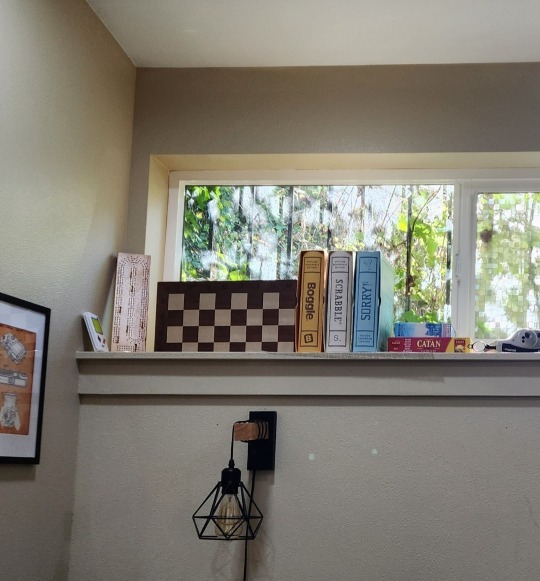
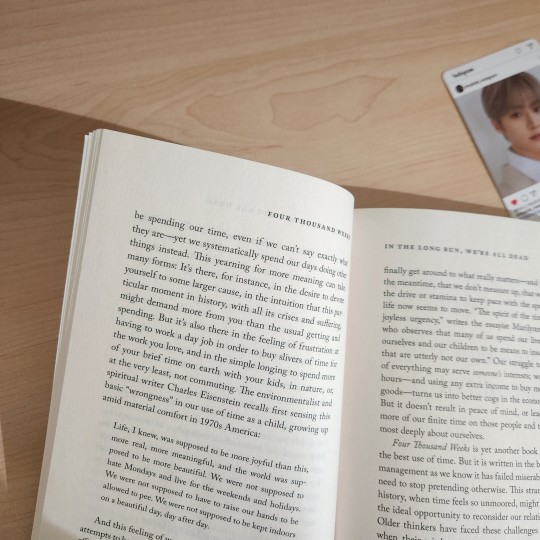
12/100 days of productivity 🐣 10/06/23
started the day with work in the morning. i finished a lot of tasks for an upcoming work event that i'm really excited about. then, i went to class — woohoo! no more skipping for me. i really don't want to make skipping a habit, so i'm feeling determined to properly maintain my attendance from now on. the day actually ended pretty short for me. i left campus right after my class and visited the bookstore for some reading time, then i went home around an hour later. i wasn't very productive when i got home, though. i didn't even realize how long i was scrolling reels until i saw it was already dark out 🙃 i really have to avoid opening instagram if the purpose isn't for communication
#☁️ shoosiopao archive#☁️ shoosiopao productivity#100 days of productivity#productivity#student life#aesthetic#productivity challenge#studyblr#studying#books & libraries#booklr#bookblr#books and reading#books#bookstore#local bookstore#self improvement#self help#self help books#four thousand weeks#time management
53 notes
·
View notes
Text
The poor and the middle class work for money. The rich have money work for them.
From RICH DAD POOR DAD By Robert T. Kiyosaki
#dark academia#spilled thoughts#bookish#book review#book quotes#booklover#self help#self help books#motivatedmindset#chaotic academia#quoteoftheday#phycology#aesthetic#rich dad poor dad#money#how to heal#how to get rich
28 notes
·
View notes
Text




How to Keep a Routine without Motivation.
There are Four Laws of Behavior Change in the book, Atomic Habits. But today, I will be focusing on the Third Law: "Make it Easy".
You need a cue to trigger the habit loop.
It means in order to stick to a habit, you have to lessen the friction. Just like an alarm clock.
Throughout my self-transformation journey, I have had my fair share of trial and error and I will be sharing the system I built that has worked for me to achieve my intentions of the day.
Notion Recurring Tasks
You have probably heard stories about 'Notion being the best productivity app'. Notion is indeed the second-brain system where you can do a lot of things. It is versatile and easy to use since it syncs on both desktops and phones. But I have not seen anyone who talked about this new feature that helped me accomplish all my tasks and gave me more free time to achieve my higher self.
This has been the best system I built that is extremely helpful to my leveling-up journey. I was able to accomplish a lot of tasks and have more free time to achieve my highest self.
GUIDE: HOW TO CREATE A RECURRING TO-DO LIST
First, pick a task that you know you will be doing weekly, monthly, or yearly.
For example, every month you want to create a Monthly Workout Planner:
On your page, type /gallery and click the Gallery view.
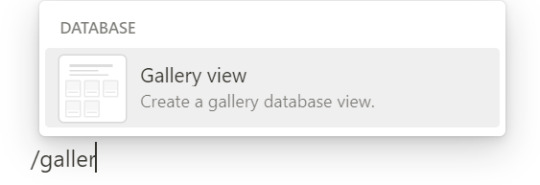
2. Click the drop-down arrow on the upper right side and click "New Template"


3. Type your recurring task
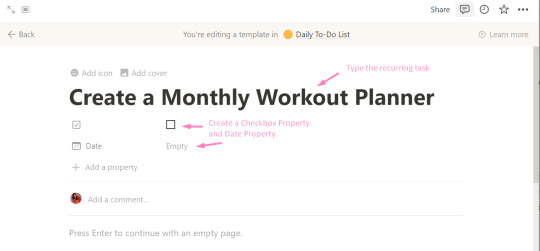
4. After that, click "Back" and Click the 3 dots to choose the frequency of the reminder.

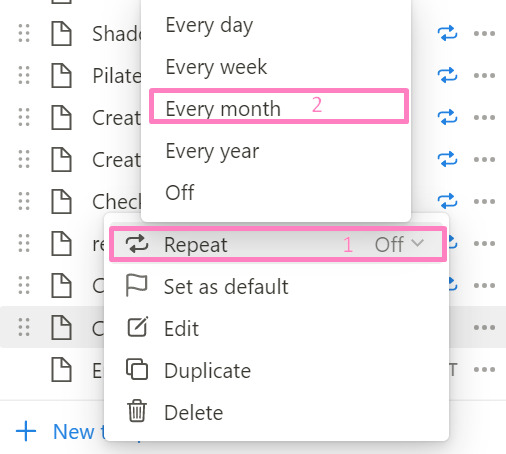
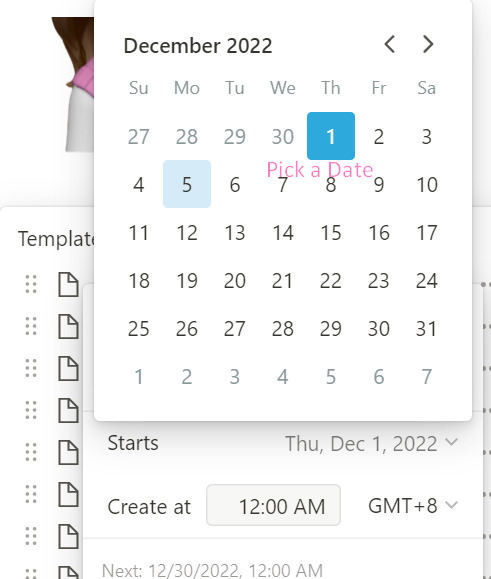

5. Your task will appear automatically on the specific day you set.
Note: You should check your daily to-do task every day because the app doesn't have a feature yet to remind you of the recurring task

WHAT SHOULD I PUT ON MY RECURRING TASK?
I do tasks based on the planetary ruler of the day.
Astro girl coming in...
Have you ever wondered why a lot of people don't like going to work on Mondays? It is because Monday is ruled by the moon. The energy of the day is encouraging us to rest and take things slow.
Now, I'm not saying you shouldn't show up at work or sit on your couch for the whole day! It's about doing prioritized tasks intentionally and not putting too much on your plate. However, if you feel like doing a lot of things on Monday then do it and don't waste your energy!
I like doing Yoga, Meditation, and Journaling every Monday to honor the Moon so I put them on a recurring task.
Tuesday is ruled by Mars. It's good to keep things fired up by working out and accomplishing a lot tasks as possible
Saturday is ruled by Saturn so it is the best day to structure and plan for the next week, clean, and change beddings.
and so on...
This is a wonderful guide on how to organize your week based on the energy of the day.
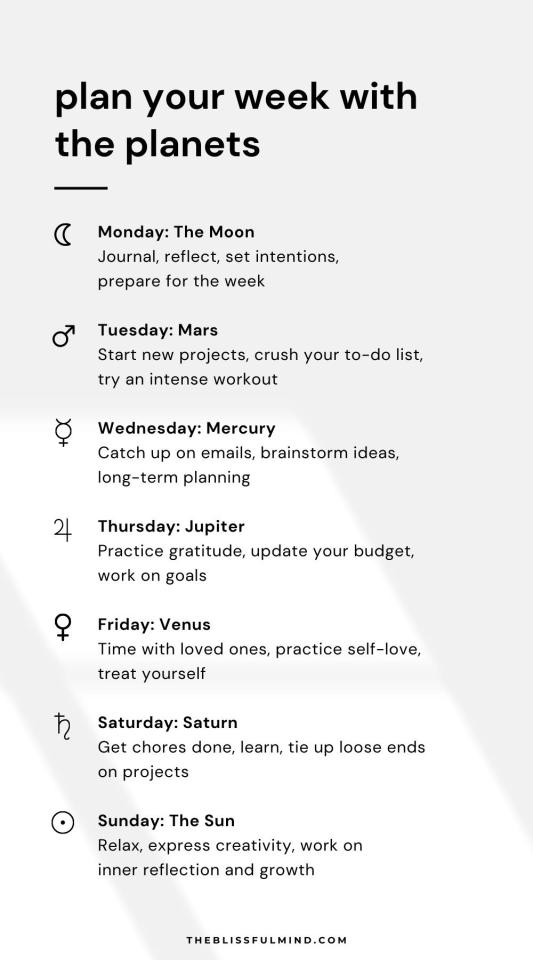
Source: The Blissful Mind
#daily routine#routine#productivity#motivation#get motivated#mindset#self-help#self development#astrology#planetary rulers#days of the week#weekly routine#monthly routine#notion#tasks#discipline#atomic habits#james clear#self help books#self development books#psychology#self improvement
275 notes
·
View notes
Text
When we let go of the conceptions we have of stereotypical judgements, we open ourselves to a beautiful and authentic human experience.
#DontSweatTheSmallStuff #Omnibus
By Richard Carlson (Part II - 21-24)
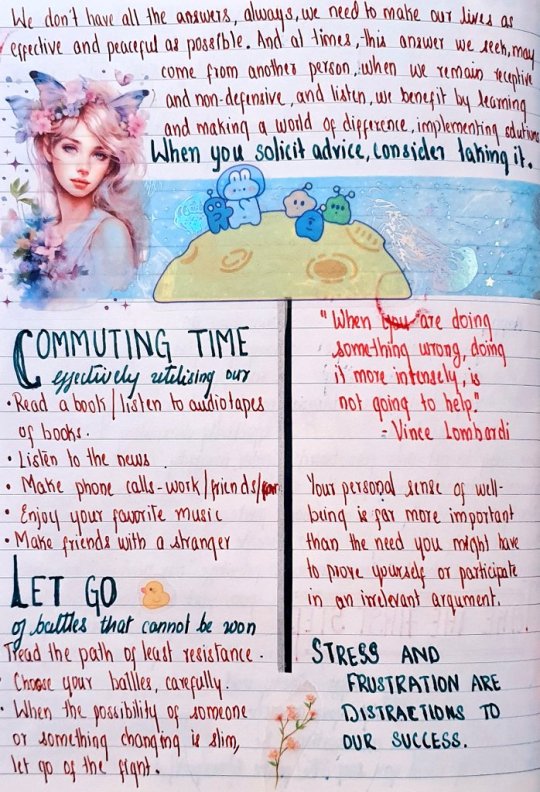
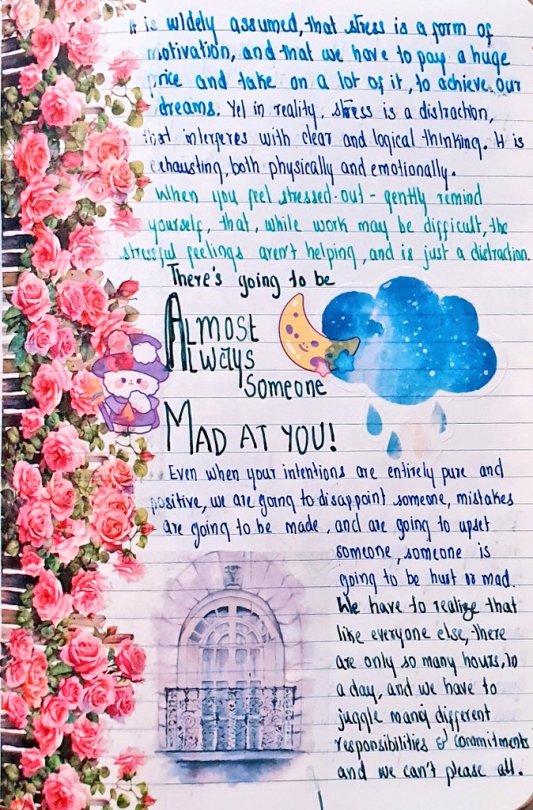

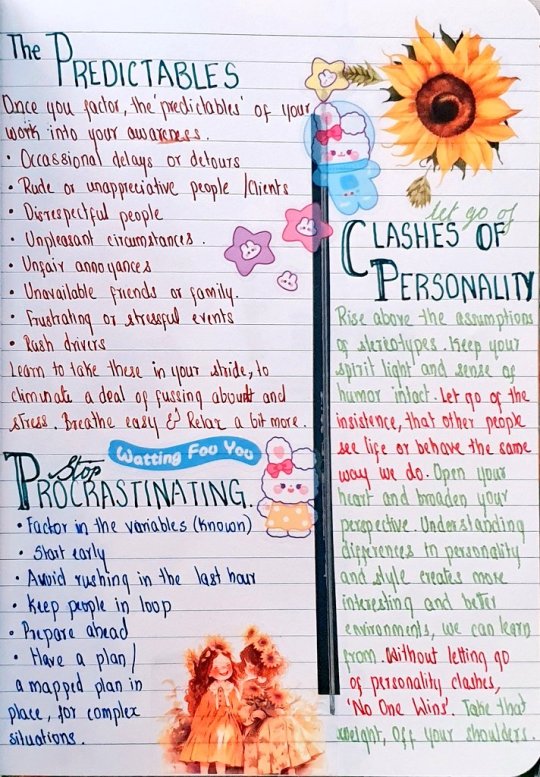
#dont sweat the small stuff#richard carlson#work life balance#work life#self help books#self help#books#book#booklr#book addict#book and reading#book analysis#notes#notebook#noteblr#note bait#art journal#journaling#journal
8 notes
·
View notes
Text
Passive dependency
Source: The Road Less Travelled - M. Scott Peck

Passive dependency has its genesis in lack of love.
The inner feeling of emptiness from which passive dependent people suffer is the direct result of their parents' failure to fulfil their needs for affection, attention and care during their child-hood.
It was mentioned in the first section that children who are loved and cared for with relative consistency throughout childhood enter adulthood with a deep-seated feeling that they are lovable and valuable and therefore will be loved and cared for as long as they remain true to themselves.
Children growing up in an atmosphere in which love and care are lacking or given with gross inconsistency enter adulthood with no such sense of inner security.
Rather, they have an inner sense of insecurity, a feeling of "I don't have enough" and a sense that the world is unpredictable and ungiving, as well as a sense of themselves as being questionably lovable and valuable.
It is no wonder, then, that they feel the need to scramble for love, care and attention
wherever they can find it, and once having found it, cling to it with a desperation that leads them to unloving, manipulative, Machiavellian behaviour that destroys the very relationships they seek to preserve.
As also indicated in the previous section, love and discipline go hand in hand, so that unloving, uncaring parents are people lacking in discipline, and when they fail to provide their children with a sense of being loved, they also fail to provide them with the capacity for self-discipline.
Thus the excessive dependency of the passive dependent individuals is only the principal manifestation of their personality disorder.
Passive dependent people lack self-discipline.
They are unwilling or unable to delay gratification of their hunger for attention.
In their desperation to form and preserve attachments they throw honesty to the winds. They cling to outworn relationships when they should give them up. Most important, they lack a sense of responsibility for themselves.
They passively look to others, frequently even their own children, as the source of their happiness and fulfilment, and therefore when they are not happy or fulfilled they basically feel that others are responsible.
Consequently they are endlessly angry, because they endlessly feel let down by others who can never in reality fulfil all their needs or "make" them happy.
I have a colleague who often tells people, "Look, allowing yourself to be dependent on another person is the worst possible thing you can do to yourself. You would be better off being dependent on heroin. As long as you have a supply of it, heroin will never let you down; if it's there, it will always make you happy. But if you expect another person to make you happy, you'll be endlessly disappointed."
As a matter of fact, it is no accident that the most common disturbance that passive dependent people manifest beyond their relationships to others is dependency on drugs and alcohol.
Theirs is the "addictive" personality.
"They are addicted to people, sucking on them and gobbling them up, and when people are not available to be sucked and gobbled, they often turn to the bottle or the needle or the pill as a people-substitute."
In summary, dependency may appear to be love because it is a force that causes people to fiercely attach themselves to one another. But in actuality it is not love; it is a form of antilove. It has its genesis in a parental failure to love and it perpetuates the failure.
It seeks to receive rather than to give. It nourishes infantilism rather than growth. It works to trap and constrict rather than to liberate. Ultimately it destroys rather than builds relationships, and it destroys rather than builds people.
#self-help#self help#love#limerance#dependency#co-dependency#co dependent#yandere#obsessiveness#obsessive love#obsession#trauma#insecure attachment#anxious attachment#disorganized attachment#M. scott peck#self help books#books#wisdom#improvement#limerant#childhood trauma#quotes#distinction#help#trauma-bond#trauma bond#trauma bonding#addictive personality#addiction
8 notes
·
View notes
Text
Best Quotes From 'Women Don't Owe You Pretty'
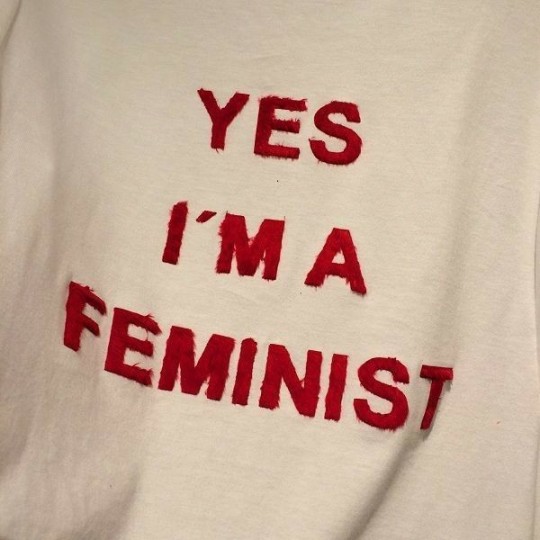


"Choosing yourself will always disappoint some people. The sooner we accept this and make peace with it, the better."
"The world owes you nothing, and equally you owe it nothing."
"Stop breaking yourself down into bite-sized pieces. Stay whole and let them choke."
"They're just a distraction. Carry on as you were."
"Crumbs can’t feed me. I want the cake."
"Your character is not to be judged by the mistakes you make – but your ability to hold yourself accountable, interrogate your actions and come back with the correct behaviour."
"Promise yourself to stop buying into people’s potential. You’re not a start-up investor."
"No one’s approval is ever worth compromising your own boundaries and abandoning your own beliefs for."
"Imagine the person you'd be if you stopped trying to fix others and put that energy into yourself."
#women don't owe you pretty#florence given#books#book blog#booklr#readblr#book reccs#book recommendations#bookaddict#bookworm#book quotes#books and reading#book community#quotes#self love#self empowerment#self image#self love books#self help books#self help#inspiring quotes#feminist books#feminism#feminist#book quote#self worth
29 notes
·
View notes
Text
"Without imagination there is no hope, no chance to envision a better future, no place to go, no goal to reach."
— The Body Keeps the Score by Bessel van der Kolk
#the body keeps the score#bessel van der kolk#self help books#self help#book quote#quotation#book quotes#quotes#life quote#literature#literary quotes#literature quotes#book quotations#literature study notes#literary criticism#literary quotations#bookblr#booklr#books#book#book blog#booklover
12 notes
·
View notes
Text

Illustration by Monica Garwood
* * * *
From The New York Times Well newsletter
By Carolyn Todd
Feb. 9, 2024
Of the thousands of self-help books on the market, which ones are truly helpful? “It’s uncommon to find a self-help book that feels different,” said Vienna Pharaon, a marriage and family therapist in New York City.
But genuinely useful titles abound. The best of the genre invite reflection or offer practical tools to promote emotional, psychological or spiritual well-being. And there are some that therapists personally turn to or suggest to their patients.
“Almost every therapist I know has a whole list of self-help books to recommend,” said Daniel Tomasulo, a counseling psychologist and the academic director of the Spirituality Mind Body Institute at Teachers College, Columbia University.
When sorting through the self-help stacks, who better to help than mental health professionals? We asked seven to share their picks.
1. "The Book of Joy: Lasting Happiness in a Changing World," by the Dalai Lama, Desmond Tutu with Douglas Abrams
How do we experience joy in the face of personal and collective suffering? The Dalai Lama and Desmond Tutu spent five days reflecting on their own lives to answer that question, and they compiled their stories and guidance in this 2016 book.
“The Book of Joy” is an opportunity to learn from two spiritual leaders in an intimate, accessible way, said Sona Dimidjian, director of the Renée Crown Wellness Institute at the University of Colorado Boulder.
Through their dialogue, which is punctuated with laughter and tears, the Dalai Lama and Archbishop Tutu teach readers how to cultivate joy and work through difficulties like illness and despair. Dr. Dimidjian recommends the book to “anyone who is feeling overwhelmed by the realities of our world and daily life today,” she said.
2. "The Happiness Trap: How to Stop Struggling and Start Living," by Russ Harris
This book, first published in 2007, teaches you to accept your negative thoughts and feelings as they arise, instead of resisting or being consumed by them — a refreshing approach known as acceptance and commitment therapy.
Diana Garcia, a South Florida-based therapist, says this easy-to-read primer made her “first fall in love” with ACT. She has clients use the book as a supplement to their sessions and recommends it to friends who are feeling stuck. It teaches you how to keep taking actions that move you in a positive direction regardless of how you’re feeling, she explained.
3. "Tattoos on the Heart: The Power of Boundless Compassion," by Gregory Boyle
Gregory Boyle is a Jesuit priest who founded Homeboy Industries, a rehabilitation and re-entry program for former gang members. His 2011 book is a collection of real, raw stories about people he worked with and the lessons we can all draw from their experiences.
“Each chapter reads like a Sunday sermon to be savored and meditated upon,” said Jacob Ham, director of the Center for Child Trauma and Resilience at the Icahn School of Medicine at Mount Sinai. While faith is woven throughout the book, Dr. Ham recommends the title to anyone who feels “that their traumas and all the ways they’ve coped with them have left them broken and unredeemable.”
4. "The Artist’s Way: A Spiritual Path to Higher Creativity," by Julia Cameron
This 1992 workbook from Julia Cameron, a teacher and author, is a 12-week guide to recovering your sense of childlike creativity. And it’s not just for artists and writers, said Britt Frank, a trauma specialist in Kansas.
“Of all of the books I have ever used with clients, this one has the most staying power,” she said. “Because everyone is creative, and creativity is medicine.”
For years, Ms. Frank has returned to the book’s tools — like the “morning pages,” a stream-of-consciousness journaling practice. And she uses “The Artist’s Way” when treating clients with issues like depression and addiction. But skimmers beware, Ms. Frank cautioned: “It’s not a book you read. It’s a book you work.”
5. "Homecoming: Healing Trauma to Reclaim Your Authentic Self, by Thema Bryant
Thema Bryant is a trauma therapist, ordained minister and professor who offers a “distinctive lens on health, hope and healing trauma,” said Ayanna Abrams, a psychologist in Atlanta.
Drawing on her clinical work, spirituality and personal recovery from trauma, Dr. Bryant shares stories, reflections and exercises in this 2022 title. She helps people believe in their capacity to heal, Dr. Abrams explained. Dr. Bryant also avoids the “gimmicky, bypassing or vague” language that so many self-help books lean on, she added.
6. "The Power of Character Strengths: Appreciate and Ignite Your Positive Personality," by Ryan M. Niemiec and Robert E. McGrath
This 2019 guide helps people recognize, honor and nurture their brightest qualities, Dr. Tomasulo said. The idea of cultivating your “character strengths” comes from positive psychology, which centers on promoting well-being, he explained. “It’s about moving from focusing on ‘what’s wrong’ to ‘what’s strong.’”
People who lean into their character strengths tend to be happier, Dr. Tomasulo said. This book, he explained, is a good pick for “people who are doing OK, but want to have more joy and well-being in their life.”
[Follies of God]
8 notes
·
View notes
Text
Taron Egerton & Rachel Weisz Actors on Actors full interview and behind the scene photoshoot clip
youtube
#taron egerton#rachel weisz#variety#actors on actors#i love this so much#self help books#RADA's bit of rough
52 notes
·
View notes
Text
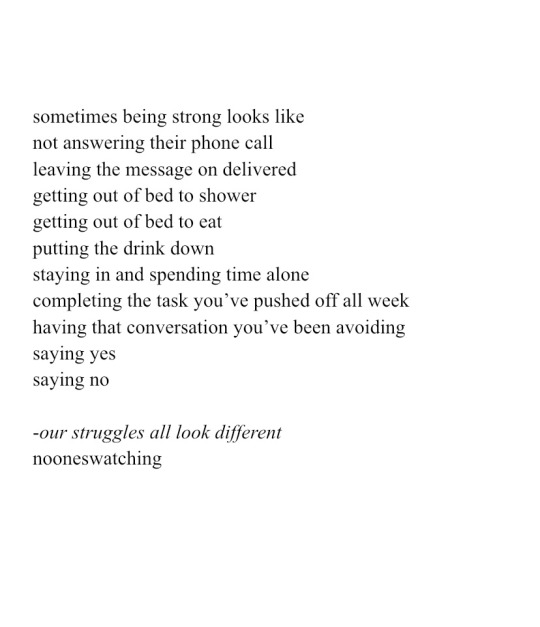
from my book “stepping towards the mirror”
#nooneswatching#poetry#poetry corner#healing#mental health#healing journal#poetscommunity#self love#self help books#women writers
18 notes
·
View notes
Text
youtube
Watch the American Climate Leadership Awards 2024 now: https://youtu.be/bWiW4Rp8vF0?feature=shared
The American Climate Leadership Awards 2024 broadcast recording is now available on ecoAmerica's YouTube channel for viewers to be inspired by active climate leaders. Watch to find out which finalist received the $50,000 grand prize! Hosted by Vanessa Hauc and featuring Bill McKibben and Katharine Hayhoe!
#ACLA24#ACLA24Leaders#youtube#youtube video#climate leaders#climate solutions#climate action#climate and environment#climate#climate change#climate and health#climate blog#climate justice#climate news#weather and climate#environmental news#environment#environmental awareness#environment and health#environmental#environmental issues#environmental justice#environment protection#environmental health#Youtube
17K notes
·
View notes
Text




Page Five of When I Say No, I Feel Guilty by Manuel J. Smith, Ph.D. that I bought at a thrift store.
I am using the cut-up technique and going page by page.
#dave.txt#she speaks#poetry#self help books#When I Say No I Feel Guilty#Cut-up technique#coping#depression#This is about being discharged from the mental hospital when we were 14 and returning to school#And not being able to heal because we were too embarrassed to open up to our friends about the reality of our mental state#We were too busy thinking about how we must be overreacting.#Silently trying to piece ourselves together like a puzzle because we're afraid of using the wrong words and getting called fake#And for years we doubted our transness because we couldn't.. Tell if we were faking it for attention. Bc that's what it always feels like#It all feels so fake because every detail about ourselves feels like a grab for attention.#Just thinking about being depressed felt like we were making a mockery out of ppl who were actually depressed and suicidal#I'm sorry for being so emotional about this piece. For trauma dumping. I'm also sorry if you're reading this. And sorry that I was scared.#I am okay I'm just really tired. Tired of being sick. Being sick makes me cry. I feel so useless. Like a lump.#I am curling up in embarrassment#dear diary#vent
28 notes
·
View notes
Text
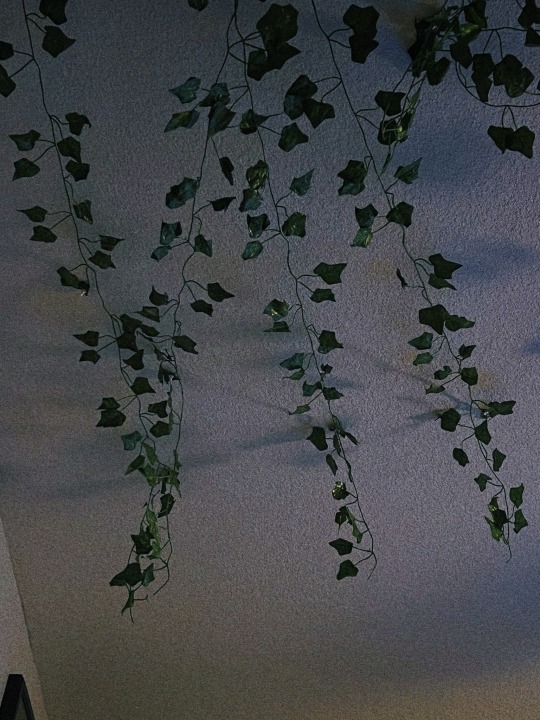
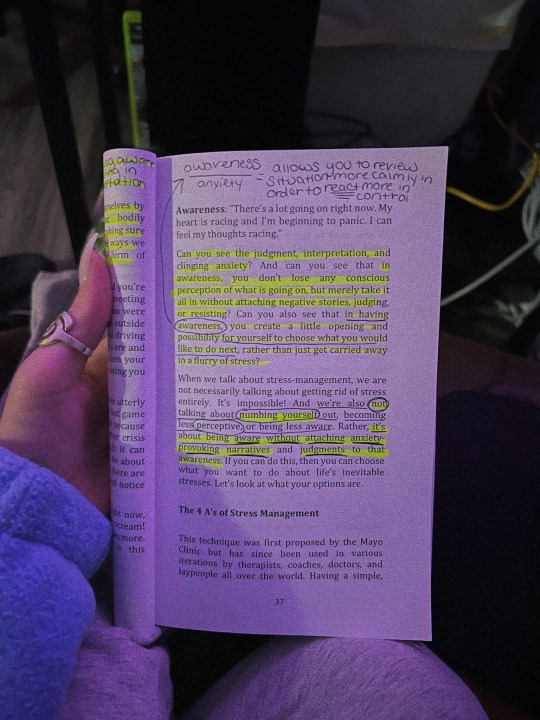
In my self help book era🔮💭
#personal#hipster#hippie#boho#good vibes#hippie vibes#bohemian#happy#peaceful#peace#it’s all good#aesthetic#book#bookworm#current read#stop overthinking#self help books#vibes
11 notes
·
View notes
Text

“Padre Rico, Padre Pobre” de Robert Kiyosaki y Sharon Lechter
#padre rico padre pobre#robert kiyosaki#autoayuda#libros#libro de autoayuda#selfhelp#self help books#book#books#bookgram#bookgasm#booklover#booklovers#instabooks#books i ve read#girls reading#women reading#currently reading#la gente anda leyendo#leyendo#leo y comparto#leo y reseño#buenos aires#lectores#lectoras#wattpad#goodreads#book review
12 notes
·
View notes
Text
maybe this year we should come to terms with our self sabotaging girlboss behaviors and actually reflect on things
#the mountain is you#maybe i will change#new year same me#new year new me#black swan#girl blogging#girl boss#girl power#healthy coping mechanisms#self sabotage#self help books#i dont look pretty when i cry so i should stop
78 notes
·
View notes
Text
youtube
Watch the 2024 American Climate Leadership Awards for High School Students now: https://youtu.be/5C-bb9PoRLc
The recording is now available on ecoAmerica's YouTube channel for viewers to be inspired by student climate leaders! Join Aishah-Nyeta Brown & Jerome Foster II and be inspired by student climate leaders as we recognize the High School Student finalists. Watch now to find out which student received the $25,000 grand prize and top recognition!
#ACLA24#ACLA24HighSchoolStudents#youtube#youtube video#climate leaders#climate solutions#climate action#climate and environment#climate#climate change#climate and health#climate blog#climate justice#climate news#weather and climate#environmental news#environment#environmental awareness#environment and health#environmental#environmental issues#environmental education#environmental justice#environmental protection#environmental health#high school students#high school#youth#youth of america#school
17K notes
·
View notes